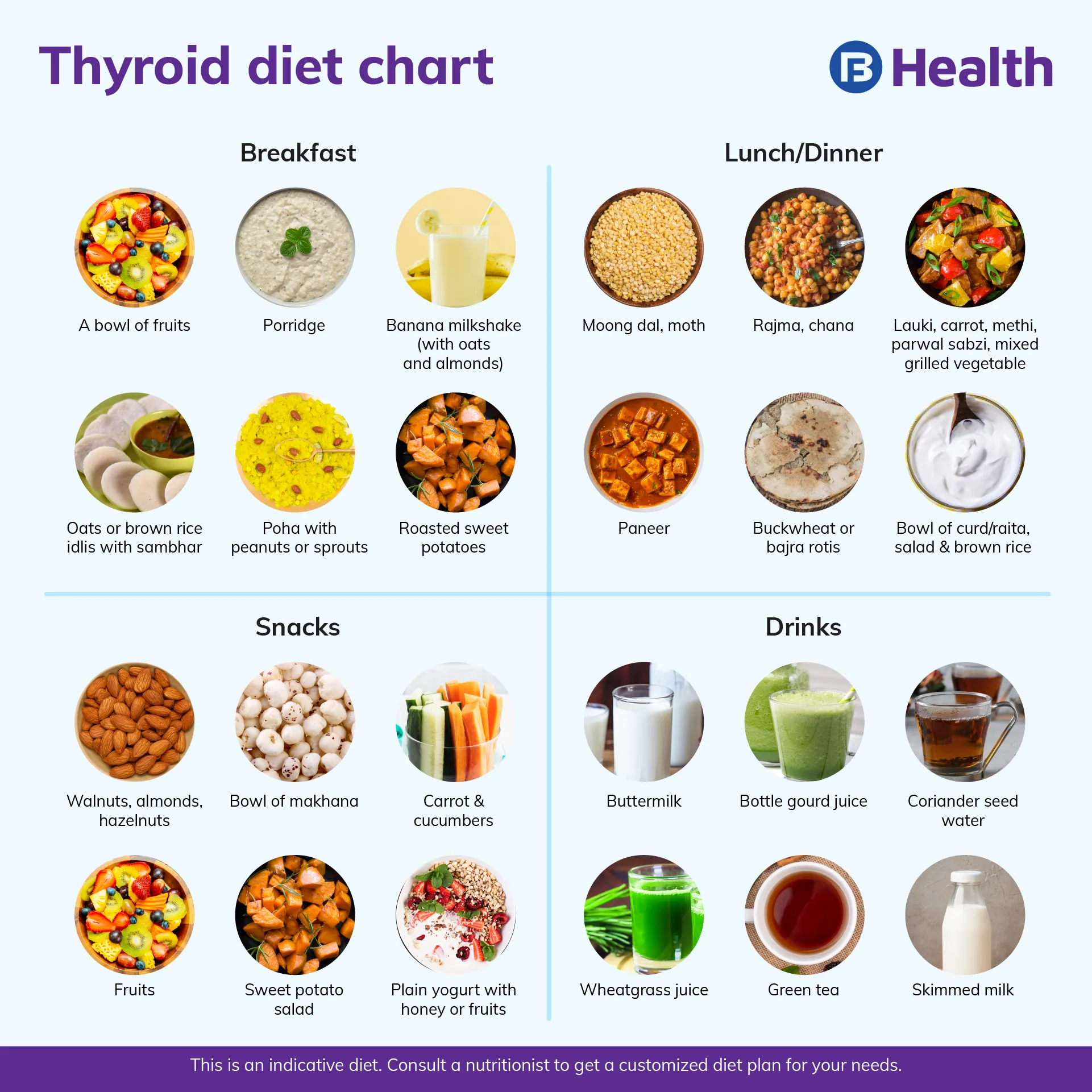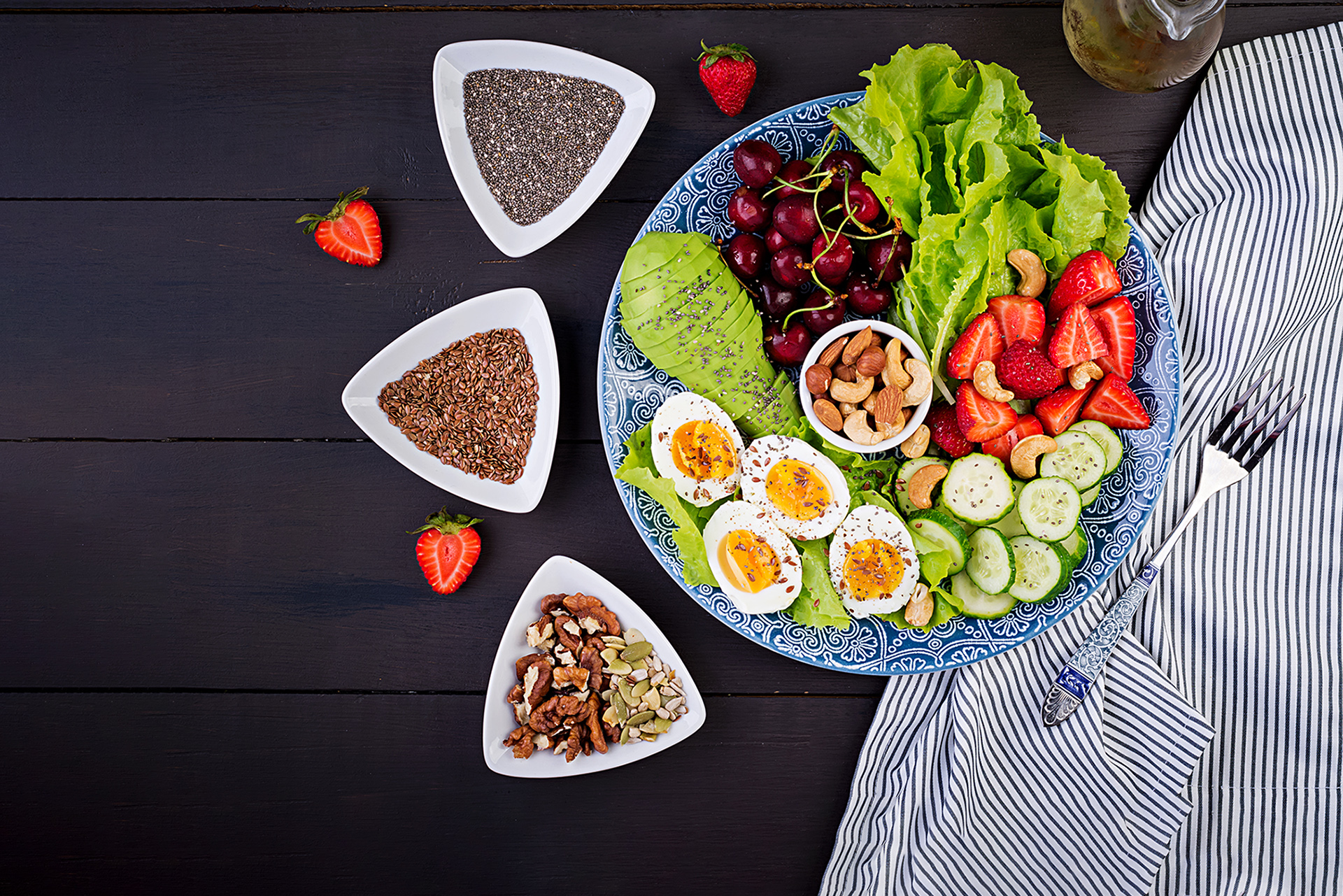Endocrinology | 7 min read
Best Foods for Hypothyroidism Diet: What Foods to Eat and Avoid
Medically reviewed by
Table of Content
Key Takeaways
- As of 2017, a diagnostic lab found that hypothyroidism is widespread in North India, and West and South India
- If you are a thyroid patient, minerals such as iodine, selenium, iron and zinc are essential
- Find out the foods to eat or avoid & get a hypothyroidism diet chart
Within your body, the thyroid gland produces hormones. If it produces these hormones in excess or doesn’t produce enough, you’re diagnosed with a thyroid disorder. In the event that your body produces too much thyroid hormone, you suffer from hyperthyroidism. Likewise, if you produce insufficient thyroid hormone, you suffer from hypothyroidism.
As of 2017, a diagnostic lab found that hypothyroidism is widespread in North India, and West and South India reported more cases of hyperthyroidism. More recently, in 2019, a study found that 1 out of 10 Indian adults suffer from hypothyroidism. When uncontrolled, it can lead to obesity, joint pain, heart disease and even infertility.
To treat thyroid disorders, doctors prescribe medication that restores the balance of hormones produced by the thyroid gland in your body. However, you can supplement these efforts with the right hypothyroidism diet. Take a look at how food is linked to thyroid, the items to add to your thyroid diet, and ones to avoid.
What is hypothyroidism?
An underactive thyroid gland causes hypothyroidism. In this condition, your thyroid cannot produce sufficient thyroid hormones required for your metabolic functions. While many early symptoms go unnoticed, hypothyroidism can cause various health ailments like obesity, infertility, and joint aches if left untreated. Food plays a crucial role in hypothyroidism. So, it is important to be aware of food to avoid thyroid patients. This helps in easy management of the condition. Seek professional advice to understand the best food for thyroid patients and follow the hypothyroidism diet plan.
How does Hypothyroidism Diet Impact?
If you are a thyroid patient, minerals such as iodine, selenium, iron and zinc are among the nutrients that are essential for your body. However, if you don’t eat the right foods in the right quantities, you may not get these essential nutrients. Conversely, certain foods may absorb these nutrients from your body, depleting their reserves, or block your thyroid gland from absorbing them. This in turn can result in complications such as goitre. Keeping this in mind, take a look at the foods that are best food for thyroid and the foods you should avoid.
Best Foods for Hypothyroidism Diet
If you are among the many Indians who suffer from hypothyroidism, consider adding the following foods to your hypothyroidism diet to restore thyroid function and alleviate symptoms that accompany thyroid.

Eggs
Eggs are one of the best food for thyroid, as they are rich in both iodine and selenium. A single egg contains roughly 16% and 20% of your daily requirement of iodine and selenium, respectively. However, for maximum benefit from this superfood, be sure to eat the whole egg and not just the egg white!
Yogurt
Yogurt or curd is also a good addition to your thyroid diet. Apart from keeping you cool and providing your body with healthy fats, yogurt gives your body the iodine it needs. If you’re watching your weight, you can opt for low-fat yogurt.
Seaweed
Seaweed may seem like an unusual ingredient, but it’s a must-add to any thyroid diet as it is rich in iodine. That said, seaweed is a double-edged sword. There is such a thing as too much iodine and a 1gm portion of seaweed can some time pack in a whopping 1,989% of your recommended daily allowance of iodine. So, it’s a good idea to snack on seaweed in moderation and read the nutrition label on its packaging carefully.
Shellfish
Shellfish such as shrimp, prawns, oysters, crab and lobster are excellent for when you’re looking to combat hypothyroidism diet. In addition to iodine, they also comprise zinc, another essential nutrient for those suffering from this condition. If you are allergic to shellfish, you can also eat other seafood such as cod, salmon, tuna or seabass. Optionally, you can add chicken to your hypothyroidism diet, preferably the dark meat, which contains more zinc.
Additional Read: Home Remedies for Thyroid Problems.Green leafy vegetables
Including a bowl of leafy vegetables in your daily meals is the best food for thyroid patients. Dark green veggies like spinach and kale are packed with vital nutrients like vitamin A, magnesium, and iron. While vitamin A helps your thyroid gland to produce hormones, magnesium and iron help in easy absorption of thyroid hormones. Green leafy vegetables are rich in fiber that can reduce your stomach ailments like constipation. No wonder it is always included in a hypothyroidism diet plan!

Seeds and nuts
To manage hypothyroidism, you can include seeds and nuts in your hypothyroidism diet plan. A few common seeds and nuts ideal for hypothyroidism patients include sunflower seeds, Brazil nuts, cashews, and pumpkin seeds. These nuts and seeds contain selenium that aids in the proper functioning of the thyroid gland. Munch on them as snacks, or top your salads and cereals with these seeds and nuts. Be careful to avoid walnuts when taking thyroid medications as they can interfere with the absorption of thyroid hormones.
Whole grains
Constipation is a common symptom of hypothyroidism. Therefore, eat a well-balanced diet rich in fiber to ease your bowel movements. When you eat whole grains, your body has to work hard to break them down. This increases your body's metabolism. Add oats, sprouts, and quinoa to your hypothyroidism diet to improve your thyroid gland functioning.
Broccoli
This cruciferous vegetable is the best food for thyroid patients as it is rich in vitamin C and calcium. Like whole grains, broccoli contains fiber that aids in digestion and boosts your metabolism. When you have broccoli regularly, your thyroid function improves considerably. Both vitamin C and calcium improve your bone health and help reduce hypothyroidism symptoms.
Vegetarian Hypothyroidism Diet Chart
If you suffer from thyroid, take a look at the following thyroid diet chart to understand the dishes you should incorporate into your day.
Foods to Avoid as a Thyroid Patient
Processed foods
Among various thyroid foods to avoid, processed items top the list. These foods contain excess sodium which is not ideal for patients with hypothyroidism. If you consume excess sodium, it can increase your blood pressure. With an underactive thyroid gland, high sodium intake can affect your health.
Soybeans
If you are looking for food to avoid for thyroid patients, be careful about soybeans and their products. Be it tofu or edamame; these are thyroid foods to avoid due to the presence of isoflavones. These compounds affect thyroid gland functioning and also interfere with thyroid medications.
Fiber-rich foods
While fiber helps you ease many hypothyroidism symptoms, excess fiber intake may interfere with your thyroid medications. Beans, legumes, and bread are thyroid foods to avoid as they can interfere with digestion. Make sure to have fiber-rich foods in moderation after consulting with a specialist.
Gluten products
Eating foods with gluten can minimize the effects of thyroid medications. So, gluten is a food to avoid for thyroid patients. Foods like barley and wheat are not advisable for thyroid patients, and they may need to stop gluten intake completely.
Sugary snacks and desserts
Any food high in sugar does not suit thyroid patients. This is because your metabolism slows, which can increase your BMI levels. Desserts and snacks loaded with sugar have zero nutritional value and high in calories. These are thyroid foods to avoid so that your thyroid levels do not get affected.
Fried foods
Among various thyroid foods to avoid, butter, meat, and other foods containing unhealthy fats also need to be eliminated. Fried foods prevent absorption of thyroid medicines and also interfere with the functioning of the thyroid gland.
Once you know that you suffer from a thyroid disorder, it’s a good idea to familiarize yourself with the food to avoid in the thyroid. This list includes soy, as it contains phytoestrogen, which can cause your oestrogen levels to shoot up. Increased production of oestrogen can, in turn, hamper thyroid hormone production.
Cruciferous vegetables, such as kale, broccoli, cabbage, and cauliflower, can also be harmful, in varying degrees, if you consume them in large quantities. When consumed in excess they can prevent the thyroid gland from getting the iodine it needs. Lastly, while it isn’t a food to avoid in the thyroid per se, it’s best that you refrain from drinking alcohol. It suppresses the gland’s ability to produce thyroid hormone.
Additional Read: Keto Diet for HypothyroidismBy making simple changes to your diet, you can ensure that you are aiding in your recovery as a thyroid patient. For best results, be sure to consult with a general practitioner or endocrinologist at periodic intervals. This will allow you to track your condition closely and the doctor will be able to alter your treatment plan if necessary, in a timely manner. To find the best doctor for your needs, download the Bajaj Finserv Health App from the app store on your smartphone.
View a list of specialists along with their fee, years of expertise and more. Book an in-person visit or e-consult through the app and also get discounts and special offers from partner healthcare providers. Additionally, to enjoy useful features like health plans for the family, medicine reminders and more, download the app right away!
References
- https://economictimes.indiatimes.com/magazines/panache/over-30-indians-suffering-from-thyroid-disorder-survey/articleshow/58840602.cms?from=mdr#:~:text=of%20the%20country.-,North%20India%20reported%20maximum%20cases%20of%20hypothyroidism%20while%20the%20south,country%20in%20its%20various%20forms.
- https://www.theweek.in/news/health/2019/07/23/thyroid-disorders-rise-india.html
- https://pubmed.ncbi.nlm.nih.gov/12487769/#:~:text=Several%20minerals%20and%20trace%20elements,of%20heme%2Ddependent%20thyroid%20peroxidase.
- https://www.jmnn.org/article.asp?issn=2278-1870%3Byear%3D2014%3Bvolume%3D3%3Bissue%3D2%3Bspage%3D60%3Bepage%3D65%3Baulast%3DSharma%3Baid%3DJMedNutrNutraceut_2014_3_2_60_131954
Disclaimer
Please note that this article is solely meant for informational purposes and Bajaj Finserv Health Limited (“BFHL”) does not shoulder any responsibility of the views/advice/information expressed/given by the writer/reviewer/originator. This article should not be considered as a substitute for any medical advice, diagnosis or treatment. Always consult with your trusted physician/qualified healthcare professional to evaluate your medical condition. The above article has been reviewed by a qualified doctor and BFHL is not responsible for any damages for any information or services provided by any third party.




